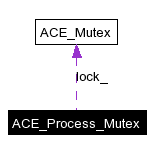
#include <Process_Mutex.h>
Collaboration diagram for ACE_Process_Mutex:

Public Member Functions | |
| ACE_Process_Mutex (const char *name=0, void *arg=0, mode_t mode=ACE_DEFAULT_FILE_PERMS) | |
| ACE_Process_Mutex (const wchar_t *name, void *arg=0, mode_t mode=ACE_DEFAULT_FILE_PERMS) | |
| ~ACE_Process_Mutex (void) | |
| int | remove (void) |
| int | acquire (void) |
| int | acquire (ACE_Time_Value &tv) |
| int | tryacquire (void) |
| int | release (void) |
| Release lock and unblock a thread at head of queue. | |
| int | acquire_read (void) |
| Acquire lock ownership (wait on queue if necessary). | |
| int | acquire_write (void) |
| Acquire lock ownership (wait on queue if necessary). | |
| int | tryacquire_read (void) |
| int | tryacquire_write (void) |
| int | tryacquire_write_upgrade (void) |
| const ACE_mutex_t & | lock (void) const |
| Return the underlying mutex. | |
| void | dump (void) const |
| Dump the state of an object. | |
Public Attributes | |
| ACE_ALLOC_HOOK_DECLARE | |
| Declare the dynamic allocation hooks. | |
Private Member Functions | |
| const ACE_TCHAR * | unique_name (void) |
| Create and return the unique name. | |
Private Attributes | |
| ACE_TCHAR | name_ [ACE_UNIQUE_NAME_LEN] |
| ACE_Mutex | lock_ |
ACE_Process_Mutex is based can be configured at build time to be either ACE_SV_Semaphore_Complex (on platforms that support it) or ACE_Mutex. On platforms that require interprocess mutexes be allocated from shared memory (Pthreads and UI Threads are examples), ACE_SV_Semaphore_Complex provides a more reliable mechanism for implementing inter-process mutex than ACE_Mutex. However, at least on some platforms, ACE_SV_Semaphore_Complex is limited to a small number of objects by the underlying System V IPC kernel parameters. If you want to force use of ACE_Mutex as the underlying mechanism, set ACE_USES_MUTEX_FOR_PROCESS_MUTEX in your config.h file. Also, if you require the ability to do a timed acquire(), you must set ACE_USES_MUTEX_FOR_PROCESS_MUTEX, as timed acquire does not work with System V semaphores.
Currently there is also the operational difference between pthreads and semaphores based . For semaphore base the semaphore is destroyed after the last instance of in OS. In contrary, pthread based is destroyed when the owner, namely the process which created the first instance of destroys the mutex. For protable applications it is better to always ensure that the owner of the mutex destroys it after the other processes.
|
||||||||||||||||
|
Create a Process_Mutex, passing in the optional
|
|
||||||||||||||||
|
Create a Process_Mutex, passing in the optional
|
|
|
|
|
|
Acquire lock ownership, but timeout if lock if hasn't been acquired by given time.
|
|
|
Acquire lock ownership (wait on queue if necessary).
|
|
|
Acquire lock ownership (wait on queue if necessary).
|
|
|
Acquire lock ownership (wait on queue if necessary).
|
|
|
Dump the state of an object.
|
|
|
Return the underlying mutex.
|
|
|
Release lock and unblock a thread at head of queue.
|
|
|
Explicitly destroy the mutex. Note that only one thread should call this method since it doesn't protect against race conditions.
|
|
|
Conditionally acquire lock (i.e., don't wait on queue).
|
|
|
Conditionally acquire a lock (i.e., won't block). Returns -1 on failure. If we "failed" because someone else already had the lock, <errno> is set to <ebusy>. |
|
|
Conditionally acquire a lock (i.e., won't block). Returns -1 on failure. If we "failed" because someone else already had the lock, <errno> is set to <ebusy>. |
|
|
This is only here for consistency with the other synchronization APIs and usability with Lock adapters. Assumes the caller already has acquired the mutex and returns 0 in all cases. |
|
|
Create and return the unique name.
|
|
|
Declare the dynamic allocation hooks.
|
|
|
|
|
|
If the user does not provide a name we generate a unique name in this buffer. |
 1.3.9.1
1.3.9.1